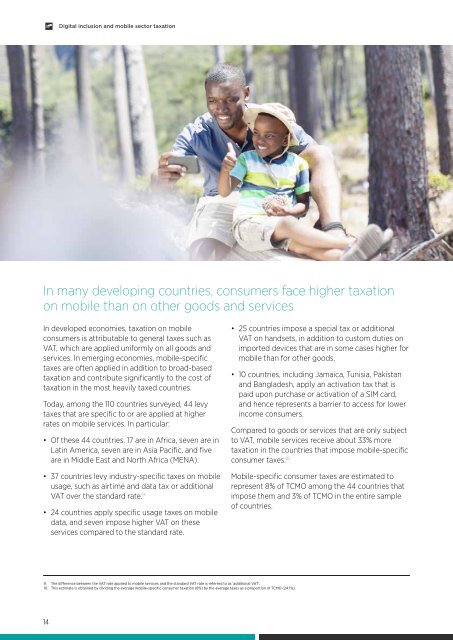Create successful ePaper yourself
Turn your PDF publications into a flip-book with our unique Google optimized e-Paper software.
Digital inclusion and mobile sector taxation<br />
In many developing countries, consumers face higher taxation<br />
on mobile than on other goods and services<br />
In developed economies, taxation on mobile<br />
consumers is attributable to general taxes such as<br />
VAT, which are applied uniformly on all goods and<br />
services. In emerging economies, mobile-specific<br />
taxes are often applied in addition to broad-based<br />
taxation and contribute significantly to the cost of<br />
taxation in the most heavily taxed countries.<br />
Today, among the 110 countries surveyed, 44 levy<br />
taxes that are specific to or are applied at higher<br />
rates on mobile services. In particular:<br />
• Of these 44 countries, 17 are in Africa, seven are in<br />
Latin America, seven are in Asia Pacific, and five<br />
are in Middle East and North Africa (MENA).<br />
• 37 countries levy industry-specific taxes on mobile<br />
usage, such as airtime and data tax or additional<br />
VAT over the standard rate. 9<br />
• 24 countries apply specific usage taxes on mobile<br />
data, and seven impose higher VAT on these<br />
services compared to the standard rate.<br />
• 25 countries impose a special tax or additional<br />
VAT on handsets, in addition to custom duties on<br />
imported devices that are in some cases higher for<br />
mobile than for other goods.<br />
• 10 countries, including Jamaica, Tunisia, Pakistan<br />
and Bangladesh, apply an activation tax that is<br />
paid upon purchase or activation of a SIM card,<br />
and hence represents a barrier to access for lower<br />
income consumers.<br />
Compared to goods or services that are only subject<br />
to VAT, mobile services receive about 33% more<br />
taxation in the countries that impose mobile-specific<br />
consumer taxes. 10<br />
Mobile-specific consumer taxes are estimated to<br />
represent 8% of TCMO among the 44 countries that<br />
impose them and 3% of TCMO in the entire sample<br />
of countries.<br />
9. The difference between the VAT rate applied to mobile services and the standard VAT rate is referred to as ‘additional VAT’.<br />
10. This estimate is obtained by dividing the average mobile-specific consumer taxation (8%) by the average taxes as a proportion of TCMO (24.1%).<br />
14


